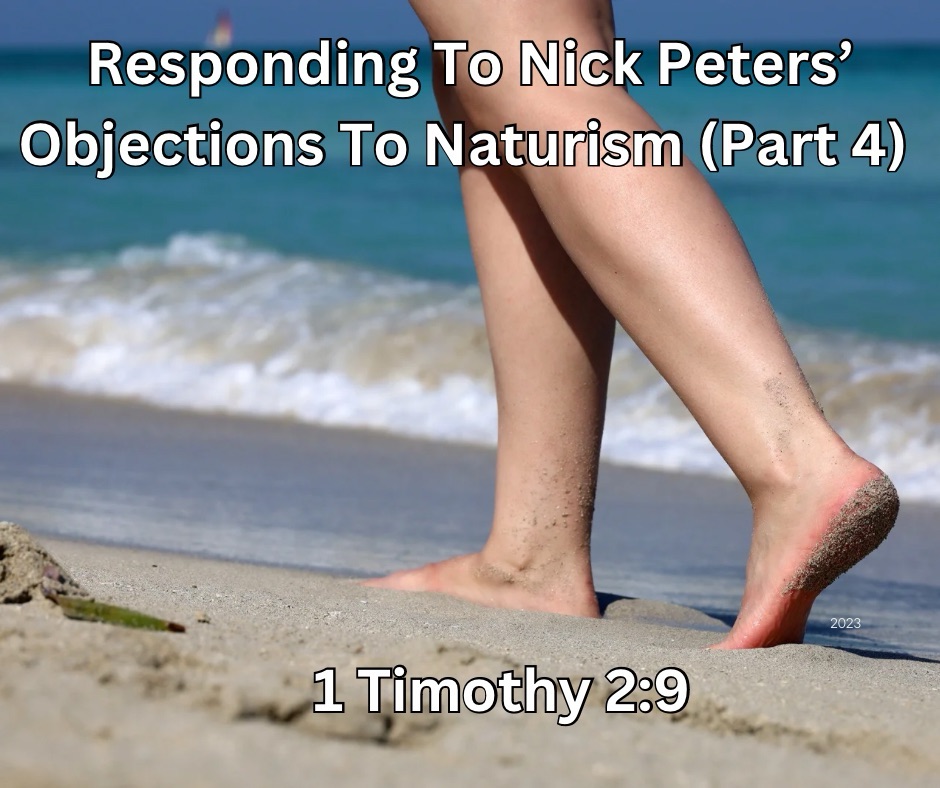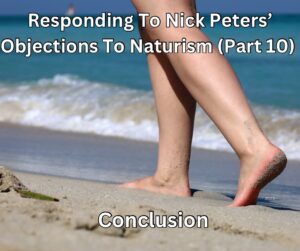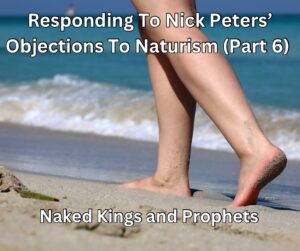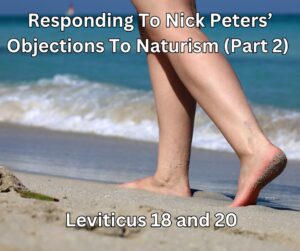This is part 4 in a series of articles in which I respond to Nick Peters of Deeper Waters Apologetics. Nick Peters is writing a series of articles critiquing Aaron Frost’s book “Christian Body: Modesty and The Bible”. Although I am not the author of the book, some of the arguments Frost uses to defend naturism biblically and sociologically are some of the same arguments I would use. His articles can be seen as criticisms of naturism in general. If you would like to reads part 1, 2, and 3 of my response series, click here, here, and here.
In this article, I will be responding to Nick Peters’ blog post “Book Plunge: Christian Body: 1 Timothy 2:9”.
Nick Peters Correctly Interprets 1 Timothy 2:9
Nick Peters wrote \\“Many people in thinking about nudity and Scripture will likely point to 1 Timothy 2:9. I would agree with them. Unfortunately, a lot of Christians also get this passage wrong thinking it is talking about something that it really isn’t. It could apply to what they think it talks about, but there’s no real reason that it would.
Many of us today think that what Paul has in mind is not to wear something that would drive a man to lust. A woman shouldn’t wear a really short skirt or a top that will show a noticeable amount of cleavage for instance. I am not saying that that idea is wrong, but I am saying that this is not what Paul is addressing in 1 Tim. 2:9.
In that context, modest dress would refer to that which would be fitting to one’s social setting. If you are not rich, you do not try to dress to look as if you are rich. In this chapter, Frost will say that clothing isn’t really addressed.“\\ [1]Nick Peters: “Book Plunge: Christian Body: 1 Timothy 2:9”, Deeper Waters Apologetics, — https://www.deeperwatersapologetics.com/2024/08/06/book-plunge-christian-body-1-timothy-29/
So, that’s good. He correctly understands that 1 Timothy 2:9 is not telling women to put more clothes on when they come to church. He’s telling the rich women not to flaunt their wealth by flashy clothing. Nick expresses that he still agrees with the idea behind how modesty proponents use this text, but he says that this verse isn’t a verse used to support that. That used to my position to. As a textile Christian with lust issues, I realized what 1 Timothy 2:9 was actually saying. In fact, I wasn’t sure if the idea of traditional modesty could be supported from scripture at all. But I still agreed with traditional modesty because, in my mind, it seemed like a good idea. I struggled with lust so mightily, I thought it would indeed be nice if women would wear as much clothing as possible. Maybe burquas is going too far, but a long sleeved shirt and baggy jeans would suffice. And as far as swimsuits go, go to those Christian swimsuit stores and get yourself a swimming dress. Stop making me aroused with your sexy two-piece bikinis! So, like Nick, my former position would have been “Yeah, this is not a good proof text, but it’s still a good idea!”
However, as I have argued in the previous article, the real cure for lust problems isn’t to hide our bodies from each other as much as possible. It’s to realize that we were not created to be turned on by the mere sight of another human being (especially if we don’t even know them). We’ve been conditioned to respond sexually to the sight of the naked body of the gender we are attracted to, and the cure is to undo the conditioning. Several Christian naturists such as myself, Chris from Mud Walkers, and Phillip Oak (just to name a few) have personally experienced the de-pornification of the body through nudism or chaste nudity. Again, read the previous article for a more thorough exposition. If you have a phobia of dogs, avoiding dogs isn’t going to make you better on the inside. You need to be around as many dogs as possible. Pet them, play fetch with them. You’ll freak out at first, but eventually you’ll realize most dogs don’t want to eat you alive.
Some Discussion On The Greek
Nick goes onto discuss some of the Greek of the passage, though I’m not sure what relevance his analysis has to the naturism/modesty debate. He writes \\“In the NT the verb occurs only in Acts 19:35–36, where the clerk calms the excited mob at Ephesus. The authority expressed by katastéllō differs from that expressed by the use of katéseisen when Paul as a witness to Christ brings the crowd to order at Jerusalem in Acts 21:27ff. The noun occurs in the advice to women believers in 1 Tim. 2:9, where Timothy is told to exhort them to adopt either a seemly demeanor or seemly apparel. The context of worship perhaps supports the former rendering, but the use of stolē for “garment” in the Apologists favors the latter.
Gerhard Kittel, Gerhard Friedrich, and Geoffrey William Bromiley, Theological Dictionary of the New Testament, Abridged in One Volume (Grand Rapids, MI: W.B. Eerdmans, 1985), 1075.
Meanwhile, another website says that:
repress, restrain, οἶκτον E.IA934; τὸν ὄχλον Act.Ap.19.35, cf. Wilcken Chr.10 (ii B.C., prob.); κ. τὰς ἐπιθυμίας Phld.Rh.2.284 S., cf. Arr.Epict.3.19.5; τοὺς νέους Plu.2.207e, cf. 547b, etc.:—Pass., ἅπαντα λήξει καὶ κατασταλήσεται Apollod.Com.18; of persons, to be placed under restraint, reduced to order, PTeb.41.21 (ii B.C.), BGU1192.5 (i B.C.); also κατεσταλμένοι τοῖς ἤθεσι of calm, sedate character, opp. τολμηρός, D.S.1.76, cf. Arr.Epict.4.4.10; κατεσταλμένον ἦθος D.S.10.3; κατέσταλται πρὸς τὸ κόσμιον Plu.Comp.Lyc.Num.3, cf. Ael.NA4.29, Arr. Epict.3.23.16.
If the reading is ambiguous then, the next place to go is as TDNT said, the apologists, these are the fathers of the first centuries of the church who knew the language and their use of it favors garment.“\\ [2]Ibid.
It is unclear what point Nick is trying to draw from this analysis of the Greek study. Based on the very next paragraph it seems as though Nick is trying to say that we can’t draw any clear conclusions about this passage at all. Since the word translated “clothes” in the original Greek is ambiguous and doesn’t see much use elsewhere. Ok. Granted. But this would then seem to support the naturist’s case that this verse cannot be used to condemn social nudity, or even lesser things like bikinis and crop tops. But then he strangely chastizes Frost by saying “The problem is if this is somewhere where Frost thinks he has a strong point, then it’s weak since we have so little usage of the word to compare and the understanding of the early church implies a garment.” Frost’s point is that this verse can’t be used to condemn skimpy outfits or nudism! That’s hist point. And since Nick Peters agreed with that right from the outset, then this comment comes across as bizarre. I can’t help but wonder if Nick really understood what Aaron Frost’s point was supposed to be. I am just left baffled by comments like this. It really does seem like Nick isn’t reading Frost’s book with an earnest attempt to understand his arguments. In fact, I wouldn’t be surprised if Nick has just skimmed the whole thing, eager to get on with what he probably views as a devastating refutation.
Finally Something Nice To Say About Frost
Nick Peters wrote \\”Now one point that Frost does get right here is when he says:
Wherever we go we should seek to dress in a way that would downplay any facade of status, elitism, or wealth that would draw attention to self-superiority. How we obey this passage depends entirely on those around us.
Frost, Aaron. Christian Body: Modesty and the Bible (p. 74). UNKNOWN. Kindle Edition.
This is certainly accurate. We should not dress in church to draw attention to ourselves. We should dress in a way that will honor God.”\\
Well, I’m certainly glad the three of us are on the same page about something. But can I add a comment about this? If you are at a nudist beach, a nudist park, being naked is not going to draw attention to yourself. Ironically, it is the clothed people at clothing optional places that draw attention to themselves. They stick out like sore thumbs! Ironically, if you ask me, in nudist settings, wearing anything at all would be a violation of 1 Timothy 2:9! If you want to blend in and not draw attention to yourself, get naked like everyone else. Also, something I have heard from countless naturists is that nudity is “the great equalizer”. It was either in Episode 55 or 56 of the “Naked, Nudists, and Naturists” podcast where the interviewee who goes by DAVA mentioned having a conversation with a man in a hot tub and only later was told that he was the governor of the state! There are no gold, pearls, fancy dresses, or anything signifying class distinctions in nudist settings. Everyone is your fellow human being, living naturally as God created them.
My point is that if Nick is trying to use the base principle of 1 Timothy 2:9 to argue that you should never be naked because you’ll draw attention to yourself, the Christian Naturist can wholeheartedly agree with this. This doesn’t mean you can’t be nude in situations where you won’t draw attention to yourself. I hope Nick doesn’t think I dress differently than anyone else when I go to church, work, the super market, etc. I don’t even go to these places shirtless.
Conclusion
This was probably the weakest article of them all. I’m not sure what Nick Peters was trying to accomplish. It seemed like he conceded the vast majority of the debate concerning this passage. I could agree with most of what he said, with some qualifications as I have done above. Next time, Nick Peters will examine how nudity was understood in The Ancient Near East and Second Temple Jewish periods.
References
| ↑1 | Nick Peters: “Book Plunge: Christian Body: 1 Timothy 2:9”, Deeper Waters Apologetics, — https://www.deeperwatersapologetics.com/2024/08/06/book-plunge-christian-body-1-timothy-29/ |
|---|---|
| ↑2 | Ibid. |





